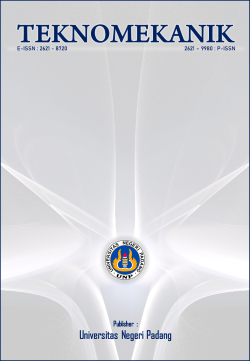Evaluation of ISO 9001 lead auditor training program using CIPP model at ATS training centre
DOI:
https://doi.org/10.24036/jptk.v5i2.27323Keywords:
Lead Auditor, CIPP Model Evaluation, Participants SatisfactionAbstract
This research is performed to evaluate the implementation of ISO 900A Lead Auditor Training program using CIPP model evaluation method which comprising of four aspects i.e.: (1) Context, (2) Input, (3) Process and (4) Product. The research method is using mixed method by using both quantitative and qualitative methods, where the data are collected using sampling technique by distributing questionnaires to 15 trainers and 25 trainees or training participants. The data also enriched by using qualitative method of interview and observation done on trainers and training participants. The results of the research and studies show that the training program from the context aspects of the trainers is 80.65% and from participants is 80.45%, from the input aspects of the trainers and participants are consecutively 81.5% and 75.87%, from the process aspects are 79.2% and 71.87%, and from the product aspects of trainers and participants are 80.02% and 75.7%. This can be concluded that the range of TPR are from 71.87% to 81.5% which fall into ‘good’ and ‘very good’ categories.
Downloads
References
Adellia, Y and Prajawinanti A. (2021). Implementasi Model Evaluasi CIPP Pada Pelaksanaan Program Kelompok Belajar TBM Leshutama Era Pandemi Covid 19. Jurnal Ilmiah Ilmu Perpustakaan dan Informasi, 9(2), pp: 14-28. DOI: http://dx.doi.org/10.18592/pk.v9i2.5516
Ambiyar and Muharika D. (2019). Metodologi Penelitian Evaluasi Program. Bandung: Alfabeta.
Arif, M T. (2019). Penelitian Evaluasi Pendidikan. Jurnal Pendidikan Agama Islam. 2(2), pp: 66-75. E-ISSN 2620-6129
Brinkerhof. (1983). Program Evaluation : Practioner's Guide for Trainers and Educators. Boston : Kluwer-Nijhoff Publishing
Darodjat and Wahyudhiana M. (2015). Model Evaluasi Program Pendidikan. Jurnal ISLAMADINA, 14(1), pp: 1-28
Djemari, M. (2015). Pengukuran, Penilaian, dan Evaluasi Pendidikan. Yogyakarta: Nuha Litera.
Fitzpatric, Sanders, & Worthen. (2011). Program Evaluation: Alternative Approaches and Practical Guidelines, 4th Edition, USA: Pearson
Gronlund, N.E. and Linn, R.L. (1990). Measurement and Evaluation in Teaching. New York: McMillan Company.
Gunung, I. N, and Darma, I.K . (2018). Development of Evaluation Instrument Context, Input, Process, Product (CIPP) Learning Program in Politeknik Negeri Bali Environment. Proceeding UCST 2017. 1(1). Link: https://ojs.pnb.ac.id/index.php/Proceedings/article/view/855
Juliyanto, et al. (2017). Evaluasi Implementasi Kurikulum dalam Aktivitas Riil pada Mata Pelajaran Melakukan Instalasi Sistem Operasi Jaringan Berbasis Graphical User Interface. Innovative Journal of Curriculum and Educational Technology. 6(2). pp: 65-71. Link: https://journal.unnes.ac.id/sju/index.php/ujet/article/view/18655/9209m
Ketut D. I. (2019). The Effectiveness of Teaching Program of CIPP Evaluation Model: Department of Mechanical Engineering, Politeknik Negeri Bali. International Research Journal of Engineering, IT & Scientific Research. 5(3). pp: 1-13. Link: https://doi.org/10.21744/irjeis.v5n3.619
Kusumaningsih, T and Santosa B. (2019). Dual Education System in SMK Muhammadiyah Wanareja. Journal of Vocational Education Studies , JOVES. 2(2), pp: 127-136. DOI: https://doi.org/10.12928/joves.v2i2.1206
Mahmudi, I. (2011). CIPP: Suatu Model Evaluasi Program Pendidikan. Journals Gontor UNIDA. 6(1), pp: 111-125. Link: https://core.ac.uk/display/235572824
Mirzaqon, A. et al. (2018). Studi Kepustakaan Mengenai Landasan Teori dan Praktik Konseling Expressive Writing Library. Jurnal BK UNESA. 8(1), pp:1-8. Link: https://jurnalmahasiswa.unesa.ac.id/index.php/jurnal-bk-unesa/article/view/22037
Mubai, A. et al. (2021). Implementasi Model CIPP dalam Evaluasi Kurikulum Pendidikan Teknik Informatika. Jurnal Ilmu Pendidikan, EDUKATIF, 3(4), pp: 1383-1394. Link: https://edukatif.org/index.php/edukatif/index
Mufid, M. (2020). Evaluasi Model Context, Input, Process and Product (CIPP) Program Baca Tulis Al-Qur'an di Institute Agama Islam Negeri Pekalongan. Jurnal IAIN Kudus, 8(1), pp: 1-14. Link: https://journal.iainkudus.ac.id/index.php/Quality/article/view/6908
Muryadi, A. D.(2017). Model Evaluasi Program dalam Penelitian Evaluasi. Jurnal Ilmiah PENJAS, 3(1), pp: 1-16. ISSN: 2442-3874. Link: http://ejournal.utp.ac.id/index.php/JIP/article/view/538
Mustafa, P. S. (2021). Model Discrepancy Sebagai Evaluasi Program Pendidikan. Jurnal Studi Keislaman dan Ilmu Pendidikan, PALAPA. 9(1), pp: 182-198. e-ISSN: 2540-9697. Link: https://ejournal.stitpn.ac.id/index.php/palapa/article/view/1067
Nurhayani, et al. (2022). Model Evaluasi CIPP Dalam Mengevaluasi Program Pendidikan Karakter Sebagai Fungsi Pendidikan. Jurnal Inovasi Penelitian (JIP). 2(8). pp: 2353-2362. ISSN: 2722-9467. Link: https://stp-mataram.e-journal.id/JIP/article/view/1116
Nyoman G.I and Ketut D.I. (2018). Development of Evaluation Instrument Context, Input, Process, Product (CIPP) Learning Program in Politeknik Negeri Bali Environment. Proceeding IJCST 2017. Link: https://ojs.pnb.ac.id/index.php/Proceedings/article/view/855
Patton M Q. (2012). Essentials of Utilization-Focused Evaluation. California: Sage Publication
Pratiwi M, et al. (2019). Evaluasi Teaching Factory Model CIPP. Jurnal Ilmiah Pendidikan dan Pembelajaran, JIPP. 3(3). e-ISSN: 2615-6091. Link: https://ejournal.undiksha.ac.id/index.php/JIPP/article/download/22205/13870
Rogala, P & Wawak, S. (2021). Quality of the ISO 9000 series of standards-perceptions of quality management experts. International Journal of Quality and Service Sciences. ISSN: 1756-669X. Link: https://www.emerald.com/insight/content/doi/10.1108/IJQSS-04-2020-0065/full/html
Rudi, S & Cepi, R. (2008). Media Pembelajaran. Bandung: Jurusan Kurtekpend FPI UPI
Safitri, D.S. and Prihatin, T. (2016). Implementasi Peran Kepala Sekolah Sebagai Supervisor di Sekolah Menengah Pertama. Indonesia Journal of Curriculum and Educational Technologies Studies. 4(1). Doi: https://doi.org/10.15294/ijcets.v4i1.14278
Stufflebeam, D.L. (1983). The CIPP Model for Program Evaluation. In: Madaus, F.F., Scriven, M. and Stufflebeam D.L., Eds., Evaluation Models: Viewpoints on Educational and Human Services Evaluation, Kluwer, Norwell, 117-141. http://dx.doi.org/10.1007/978-94-009-6669-7_1
Sugiyono. (2014). Metode Penelitian Kuantitatif, Kualitatif dan Kombinasi (mixed methods). Bandung: Alfabeta
Suharsimi, A. (2009). Dasar-dasar Evaluasi Pendidikan. Jakarta: Bumi Aksara
Wijayanti, N. I, et al. (2019). Evaluasi Program Pendidikan Pemakai Dengan Model CIPP di Perpustakaan Fakultas Teknik UGM. Jurnal Ilmu Perpustakaan dan Informasi IAIN Curup, 3(1), pp: 37-65. Link: http://journal.iaincurup.ac.id/index.php/TI/article/view/790/582
Yuliana R D W, et al. (2018). The Evaluation of the CIPP Model in The Implementation of Character Education at Junior High School. Innovative Journal of Curriculum and Educational Technology. 7(2). pp: 65-77. Link: https://journal.unnes.ac.id/sju/index.php/ujet/article/view/28391
Downloads
Published
How to Cite
Issue
Section
License
Copyright (c) 2022 Decky Antony Kifta, Ambiyar Ambiyar, Fahmi Rizal, Syaiful Islami

This work is licensed under a Creative Commons Attribution 4.0 International License.





